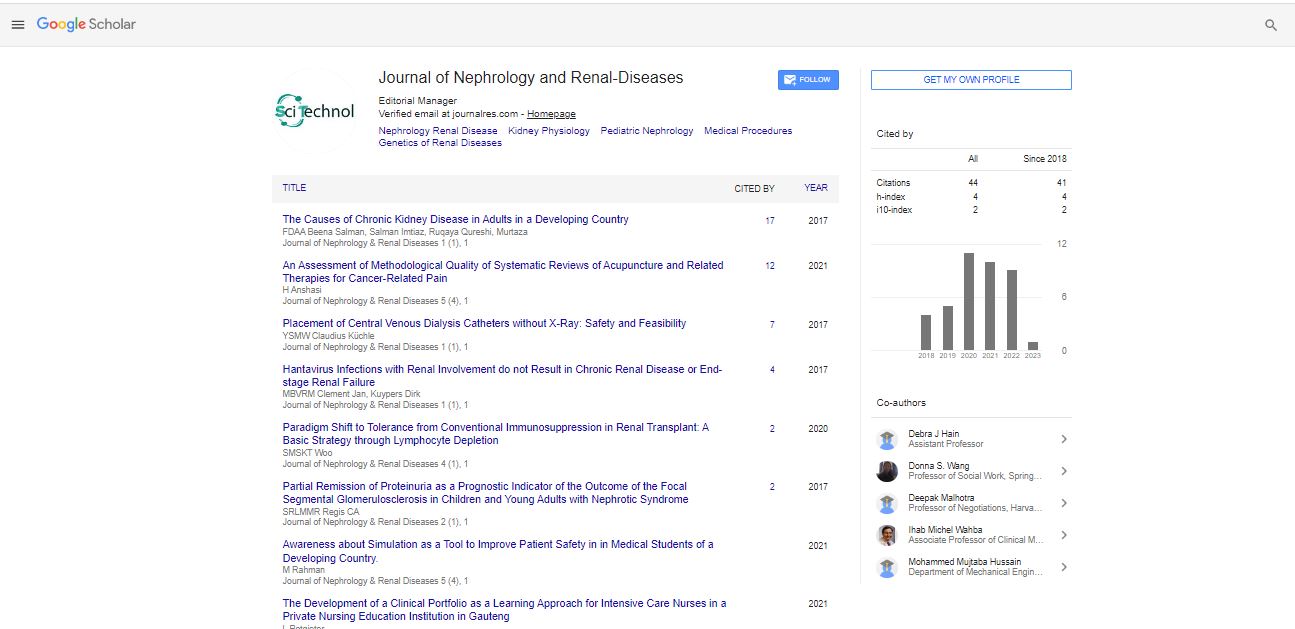Short Communication, J Nephrol Ren Dis Vol: 7 Issue: 2
Effects of Molecular Renal Disease in the Clinic Genetic Evaluation
Andjelkovic Agnes*
Department of Internal Medicine IV, Medical University Innsbruck, Innsbruck, Austria
*Corresponding Author: Andjelkovic Agnes,
Department of Internal Medicine IV, Medical University Innsbruck, Innsbruck, Austria
E-mail:andjeagnes@i-med.ac.at
Received date: 22 May, 2023, Manuscript No. JNRD-23-106991;
Editor assigned date: 25 May, 2023, PreQC No. JNRD-23-106991 (PQ);
Reviewed date: 08 June, 2023, QC No. JNRD-23-106991;
Revised date: 15 June, 2023, Manuscript No. JNRD-23-106991 (R);
Published date: 22 June, 2023, DOI: 10.4172/2576-3962.1000030
Citation: Agnes A (2023) Effects of Molecular Renal Disease in the Clinic Genetic Evaluation. J Nephrol Ren Dis 7:2.
Description
Genetic factors play a significant role in the pathogenesis of renal diseases, contributing to a wide spectrum of conditions affecting the kidneys. Renal diseases encompass a diverse range of disorders that can be caused by genetic mutations affecting various components of renal function, including glomeruli, tubules, interstitium and blood vessels. Understanding the genetic basis of renal diseases is important for accurate diagnosis, risk assessment and the development of targeted therapies.
Monogenic renal diseases result from single gene mutations inherited in a Mendelian fashion. These disorders often exhibit specific clinical features and may present at different stages of life. Examples of monogenic renal diseases include Autosomal Dominant Polycystic Kidney Disease (ADPKD), Autosomal Recessive Polycystic Kidney Disease (ARPKD), Alport syndrome, cystinuria and primary hyperoxaluria. Genetic defects in structural proteins, ion transporters and signaling molecules disrupt normal renal development, function or repair mechanisms, leading to renal damage and dysfunction [1].
Complex genetic disorders involve multiple genetic and environmental factors, making their inheritance patterns more challenging to determine. Common renal diseases such as diabetic nephropathy, hypertensive nephropathy and Chronic Kidney Disease (CKD) have a complex genetic component. Genome-Wide Association Studies (GWAS) have identified numerous genetic variants associated with the risk and progression of these diseases. These variants often influence immune responses, inflammatory pathways or components of the Renin-Angiotensin-Aldosterone System (RAAS). Additionally, gene-environment interactions contribute to the manifestation and severity of complex renal diseases [2,3].
The molecular mechanisms underlying genetic renal diseases are diverse and involve disruptions in various cellular processes. These include impaired glomerular filtration, defective tubular transport, altered extracellular matrix integrity, abnormal cellular signalling and dysregulated immune responses. Defects in genes encoding proteins involved in podocyte structure and function, ion channels and transporters, and components of the basement membrane contribute to glomerular diseases. Tubular transport disorders often result from mutations affecting solute transporters or water channels. Understanding these molecular mechanisms is important for developing targeted therapies and precision medicine approaches [4,5].
Genetic testing plays a vital role in the diagnosis, prognostication and management of renal diseases. Genetic testing can confirm a suspected genetic disorder, guide clinical decision-making and inform genetic counseling for individuals and families. Molecular diagnosis not only aids in determining the underlying etiology but also helps predict disease progression, identify potential complications and assess response to therapy. Genetic testing also allows for the identification of at-risk family members, facilitating early interventions and preventive strategies [6,7].
Genetic counseling is essential for individuals and families affected by genetic renal diseases. Genetic counselors provide information about the inheritance patterns, recurrence risks and available testing options. They help individuals make informed decisions regarding family planning, prenatal testing and pre-implantation genetic diagnosis. Moreover, the emerging field of personalized medicine aims to tailor treatment strategies based on an individual's genetic profile. Pharmacogenetic considerations can guide medication selection and dosing to optimize therapeutic outcomes while minimizing adverse effects [8].
Advances in genomic technologies, including next-generation sequencing and functional genomics, continue to expand the way of understanding the genetics of renal diseases. Further analysis is necesary to identify additional disease-causing genes, elucidate pathogenic mechanisms and develop innovative therapeutic strategies. Collaboration between analysts, clinicians and genetic counselors is important to translate genetic discoveries into improved patient care and outcomes [9,10].
Conclusion
The genetics of renal diseases play a significant role in the pathogenesis, diagnosis and management of various kidney disorders. Monogenic and complex genetic disorders contribute to a wide spectrum of renal diseases, impacting renal structure, function and homeostasis. Understanding the underlying molecular mechanisms and clinical implications of genetic renal diseases is important for accurate diagnosis, genetic counselling and personalized management strategies.
References
- Tang C, Cai J, Yin XM, Weinberg JM, Venkatachalam MA, et al. (2021) Mitochondrial quality control in kidney injury and repair. Nat Rev Nephrol 17:299-318.
- Mennuni S, Rubattu S, Pierelli G, Tocci G, Fofi C, et al. (2014) Hypertension and kidneys: Unraveling complex molecular mechanisms underlying hypertensive renal damage. J Hum Hypertens 28:74-79.
- Freedman BI, Skorecki K (2014) Gene–gene and gene–environment interactions in apolipoprotein L1 gene-associated nephropathy. Clin J Am Soc Nephrol 9:2006-2013.
- Liu Y (2011) Cellular and molecular mechanisms of renal fibrosis. Nat Rev Nephrol 7:684-696.
- Gattineni J, Baum M (2015) Developmental changes in renal tubular transport-An overview. Pediatr Nephrol 30:2085-2098.
- Dhaun N, Bellamy CO, Cattran DC, Kluth DC (2014) Utility of renal biopsy in the clinical management of renal disease. Kidney Int 85:1039-1048.
- Knappe S, Beesdo-Baum K, Wittchen HU (2010) Familial risk factors in social anxiety disorder: Calling for a family-oriented approach for targeted prevention and early intervention. Eur Child Adolesc Psychiatry 19:857-871.
- Haga SB, Mills R, Bosworth H (2014) Striking a balance in communicating pharmacogenetic test results: Promoting comprehension and minimizing adverse psychological and behavioral response. Patient Educ Couns 97:10-15.
- Renkema KY, Stokman MF, Giles RH, Knoers NV (2014) Next-generation sequencing for research and diagnostics in kidney disease. Nat Rev Nephrol 10:433-444.
- Boycott KM, Vanstone MR, Bulman DE, MacKenzie AE (2013) Rare-disease genetics in the era of next-generation sequencing: Discovery to translation. Nat Rev Genet 14:681-691.
 Spanish
Spanish  Chinese
Chinese  Russian
Russian  German
German  French
French  Japanese
Japanese  Portuguese
Portuguese  Hindi
Hindi 
